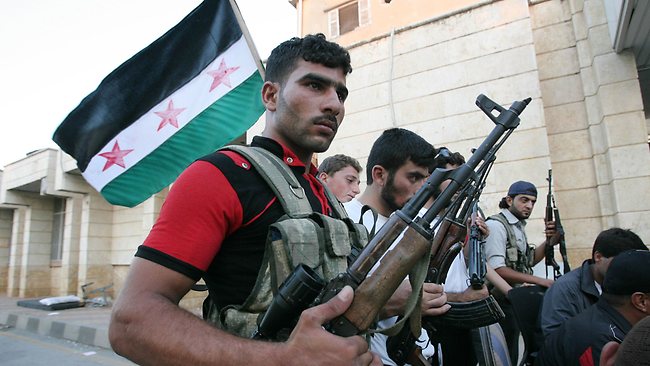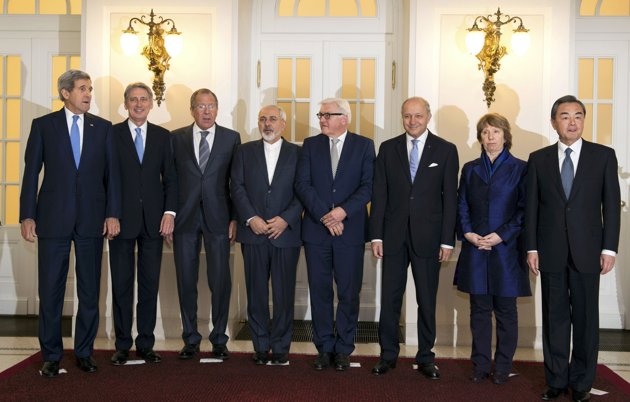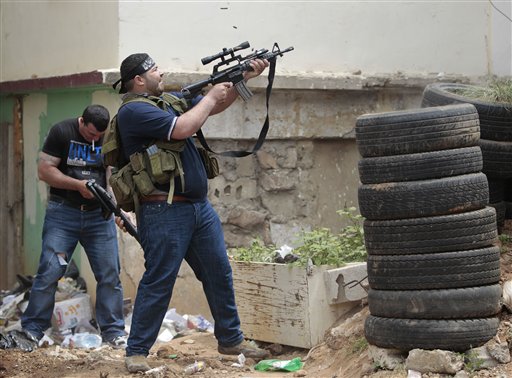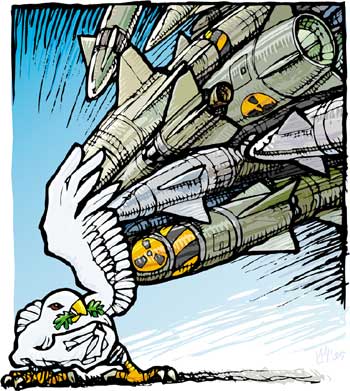Although the Arab Spring, which developed in December 2010 and became mainstream news in January 2011, has mostly faded from the minds of most, the situation in Syria has escalated rapidly leading the international community, particularly the EU and the US, to consider military responses. Furthermore, this situation is complicated by the regional religious tensions between Muslim Sunni and Shi’ia populations, as well as the vague intentions and loyalties of Hezbollah. The use of what is believed to be chemical weapons is also a major cause for concern and has the potential to seriously jeopardize peace talks in Geneva, set for 10 June 2013.
[captionpix align=”left” theme=”elegant” width=”300″ imgsrc=”http://www.nationalturk.com/en/wp-content/uploads/2012/08/syria-conflict.jpg” captiontext=””]
Military Intervention
The US’s increasing willingness to consider military intervention in 2013 is a primary result of President Obama’s “Red Line”; a phrase he coined on 20 August 2012 which refers to Obama’s changing calculus on military intervention, should chemical weapons be moved or utilized in the Syrian Civil War. Continued reports from Syria regarding the use of chemical weapons remain contradictory. As a result, analysts have suggested that it is necessary for the US to pursue military intervention in order to maintain credibility in the region.
As of 21 May 2013, the US Senate Foreign Relations Committee made some move to military intervention by approving legislation to provide Syrian rebels with small arms. Although this action does not compel the Obama administration to begin arming the rebels, the 15-3 vote in favour, as well as support from both Democrats and Republicans, indicates an increased willingness to pursue military intervention in the region and support the rebel army in a more concrete manner.
The US’ increased willingness for military intervention in Syria is also linked to a need for regional security. The conflict has escalated throughout 2013, entering into Lebanon, creating another war zone and destabilizing additional governments in a region where the US and other countries have considerable economic interests. The threat to regional security has also prompted a number of EU members to decide not to renew the arms embargo on Syria, which expired on May 31, 2013. The ending of the arms embargo also indicates a willingness to pursue military intervention in the hopes of providing stability to the region and securing the rebels’ claim to government over current Syrian President Bashar al-Assad.
Canada’s Role in Syria
In direct contrast to the US and EU desires for military intervention, Canada has remained wary of any potential military solutions to the Syrian crisis. In a speech on 7 May 2013, Foreign Affairs Minister John Baird explained that Canada desires a political, rather than a military, solution. Although Canada’s federal government has continuously called for the resignation of al-Assad, Canada, unlike most states, does not recognize the Syrian rebels as the legitimate government of Syria. As a result, Canada does not support the EU’s 28 May 2013 decision to allow its arms embargo on Syria to expire. This disagreement, which Foreign Minister Baird notes is normal for any coalition, is based on Canada’s concern about the radical jihadists who have entered into the ranks of the Syrian rebels.
[captionpix align=”left” theme=”elegant” width=”300″ imgsrc=”http://i.huffpost.com/gen/1107565/thumbs/o-JOHN-BAIRD-UNITED-NATIONS-SYRIA-facebook.jpg” captiontext=”Minister John Baird condemns the brutality of the Assad regime.”]
Canada, which is regarded as a cautious and contemplative state within NATO, continues to urge a political compromise, beginning with the peace talks scheduled for 10 June 2013 in Geneva. With the failure to renew the arms embargo and the US Senate decision to begin providing small arms to Syrian rebels, it is doubtful that these talks will even take place. Furthermore, it is likely that a political solution is not possible: experts on al-Assad indicate that he will not resign voluntarily and that military action will be necessary to remove him from power.
It is unlikely that a consensus will be reached regarding the next steps for Syria. The option of the US and EU for military intervention will likely come to fruition given the circumstances of the civil war and the threat to regional security posed by the spread of violence and the implementation of chemical weapons. NATO Secretary General Anders Fogh Rasmussen has also identified Syria as a serious concern in terms of the “use of ballistic missiles in Syria, the possible use of chemical weapons, as well as the risk of the conflict spilling over the Syrian borders.”
As a member of NATO, and with a responsibility to ensure the territorial integrity, political independence and security of other NATO members, including Turkey, as well as international peace and security, Canada’s role in a NATO military operation in Syria may be considered necessary. The French are currently conducting tests in northern Syria to confirm reports of chemical weapons used by al-Assad’s regime. If these tests result in definitive proof as to the use of these weapons, it may provide the impetus that the US and EU require for formal military intervention. While Canada has maintained a “wait-and-see” policy, a NATO intervention may only materialize as a result of a UN resolution, and then only if all member states agree to intervene.




